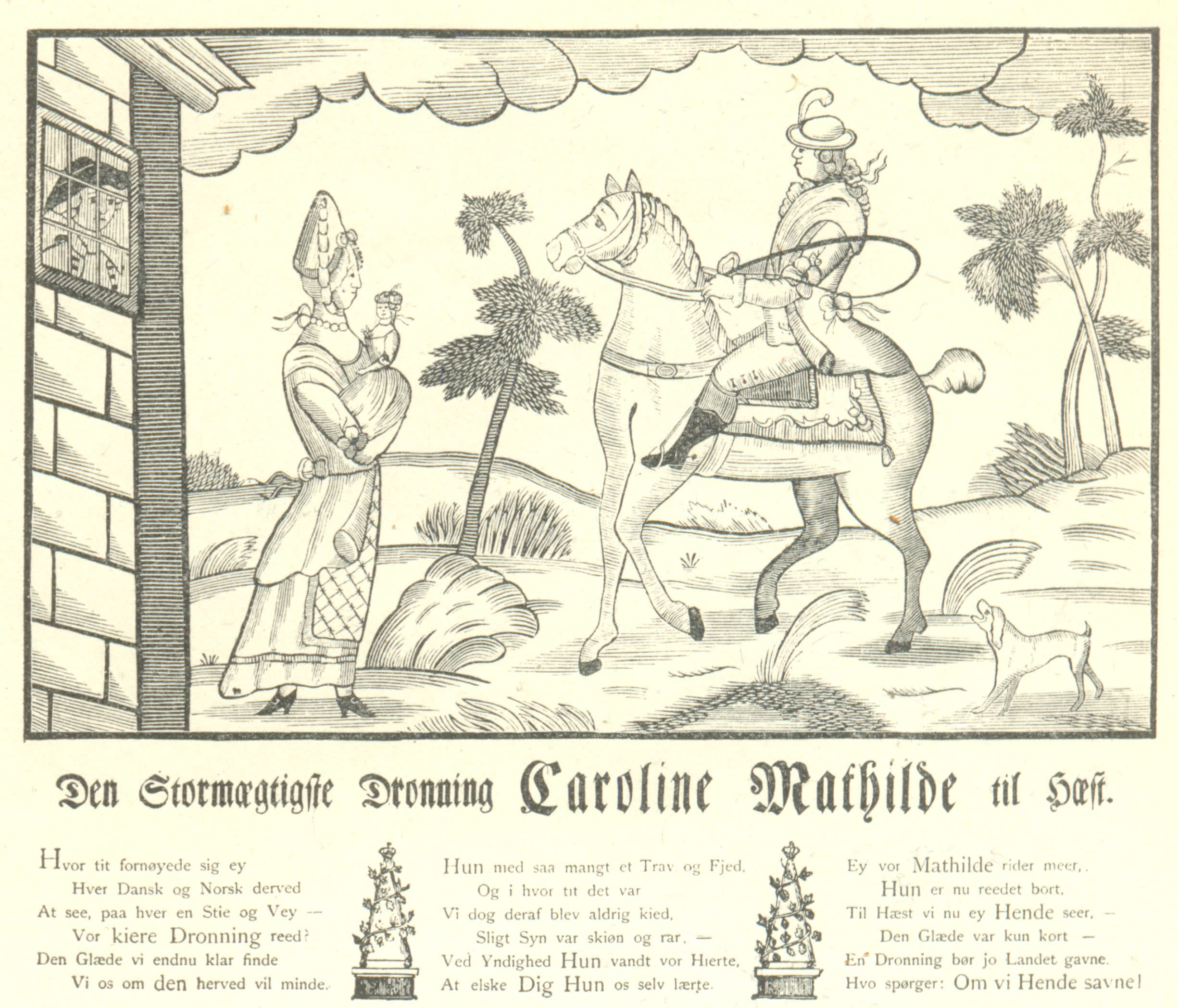
Socialistisk Biblioteks Tidslinje med links til begivenheder og personer i 1770.
Se også Index over personer, organisationer/partier og værker (som bøger, malerier, mm.), steder, begivenheder, mv., der er omtalt på hele Tidslinjen, titler og indhold på emnelisterne osv.
27. august 1770
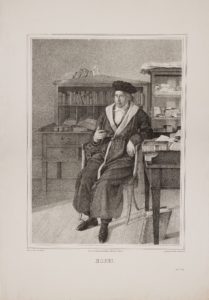
Filosoffen Wilhelm Friedrich Hegel fødes i Stuttgart (dør 14. november 1831 i Berlin).
Leksikale mv.:
- Hegel, Georg Wilhelm Friedrich (Leksikon.org)
- G.W.F. Hegel (Denstoredanske.dk)
- Georg Wilhelm Friedrich Hegel (Wikipedia.dk)
- Georg Wilhelm Friedrich Hegel (Wikipedia.org). Længere artikel.
- G. W. F. Hegel (1770-1831) (Marxists Internet Archive). Hegel biography, m. link til længere biografi.
Værker:
Hegel by Hyper Text (MIA Hegel Resource; Marxists Internet Archive)
G.W.F. Hegel (Marxists Internet Archive; Deutschsprachiger Teil; Philosophie)
Hegel’s Logic (pdf). Part one of the Encyclopaedia of the Philosophical Sciences (1830). By G.W.F. Hegel, with a Foreword by Andy Blunden (p.7-102) (Marxists Internet Archive Publications, 2008, 396 p.)
Om Hegel:
Hegel 250 år (Information.dk, 4. juli 2020 -). “I anledning af Hegels 250-års fødselsdag laver Information en sommerserie, hvor en række filosoffer forklarer de vigtigste temaer i hans filosofi.” Kræver abonnement.
G.W.F. Hegel. By Stuart Scully (Rebel, August 30, 2020). “Stuart Scully introduces some of Hegel’s key ideas, showing how they had a fundamental impact on the work of Karl Marx.”
In defence of Hegel. By Hamid Alizadeh (In Defence of Marxism, 27 August 2020). “A towering genius with an encyclopaedic mind, Hegel revolutionised every field that he dedicated himself to. The impact of Hegel’s ideas cannot be underestimated, and as Marxists we owe him a tremendous debt.”
Hegel, history and revolution (Socialist Review, Issue 454, February 2020). Interview about their book Hegel and Revolution (Bookmarks, 2020, 100 p.). “Terry Sullivan and Donny Gluckstein spoke to Socialist Review about Hegel, history and dialectics and why we still need to understand them.” See review by Stuart Lelly (Irish Marxist Review, Vol.9, No.26, 2020, p.60-61) + review by Sophia Beach: A dialectical delight (International Socialism, Issue 166, Spring 2020, p.185-189). “… accessible and excellent introduction to Hegel’s philosophy and its impact on Marxism.”
Hegel’s hard work. By Todd Chretien (SocialistWorker.org, February 23, 2011). “Marx looked to Hegel’s original method for thinking about society’s problems.”
The ‘Hegel renaissance’ and other questions. By Alexander Fangmann (World Socialist Web Site, 5 November 2009). A comment on The Cambridge Companion to Hegel and Nineteenth-Century Philosophy (2008)
The Meaning of Hegel (1891). By George Plekhanov (Fourth International, Vol.10, Nos.4 & 5, April & May 1949)
Kritik af den Hegelske Retsfilosofi. Indledning (1844). Af Karl Marx (Marxistisk Internet Arkiv: Dansk afdeling)
Se også på Socialistisk Bibliotek:
Linkboxen: Oplysningstiden/The Enlightenment
14. september 1770
På Struenses inititiativ ophæves censuren i Danmark, Trykkefriheden 1770-73 (indtil 20. oktober 1773, efter Struenses fald 17. januar 1772 og henrettelse 28. april 1772). Trykkefriheden blev endeligt afskaffet 27. september 1799 med Trykkefrihedsforordningen, som indførte censurbestemmelser.
Se:
- Trykkefrihedstiden (Wikipedia.dk). 14. september 1770 – 20. oktober 1773.
- Censur (Leksikon.org)
- Ytringsfrihed (Lex.dk)
- Trykkefrihed (Informationsordbogen). Med kilder og links.
- Trykkefrihed, 1750-1849 (Danmarkshistorien.dk) med links til kilder m.m.
- Trykkefrihedsforordningen af 1799 (Wikipedia.dk)
- Trykkefrihedsforordning givet 14. september 1770 (Rigsarkivet)
Bolle Willum Luxdorphs samling af trykkefrihedens skrifter 1770-1773 (pdf) (Bibliografi). Af Henrik Horstbøll (Fund og Forskning i Det Kongelige Biblioteks Samlinger, årg. 44, 2005, side 371-414). NB Luxdorphs samling af tryksager er grundlag for litteraturen nedenfor.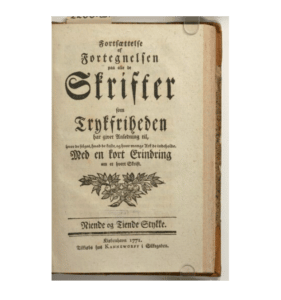
Trykkefrihedens Skrifter [= Bolle Luxdorphs samling af trykkefrihedens skrifter 1770-1773] (Det Kongelige Bibliotek). Ca. 1000 pjecer og pamfletter indsamlet efter Christian 7. og Struensee erklærede trykkefrihed d. 14. september 1770.
Gennem Bibliografi over Trykkefrihedens Skrifter kan de enkelte tryksager læses i faksimile ved at trykke på titel + på foto-ikon i øvre højre hjørne.
Se også:
- Linkbox om Oplysningstiden (Socialistisk Bibliotek)
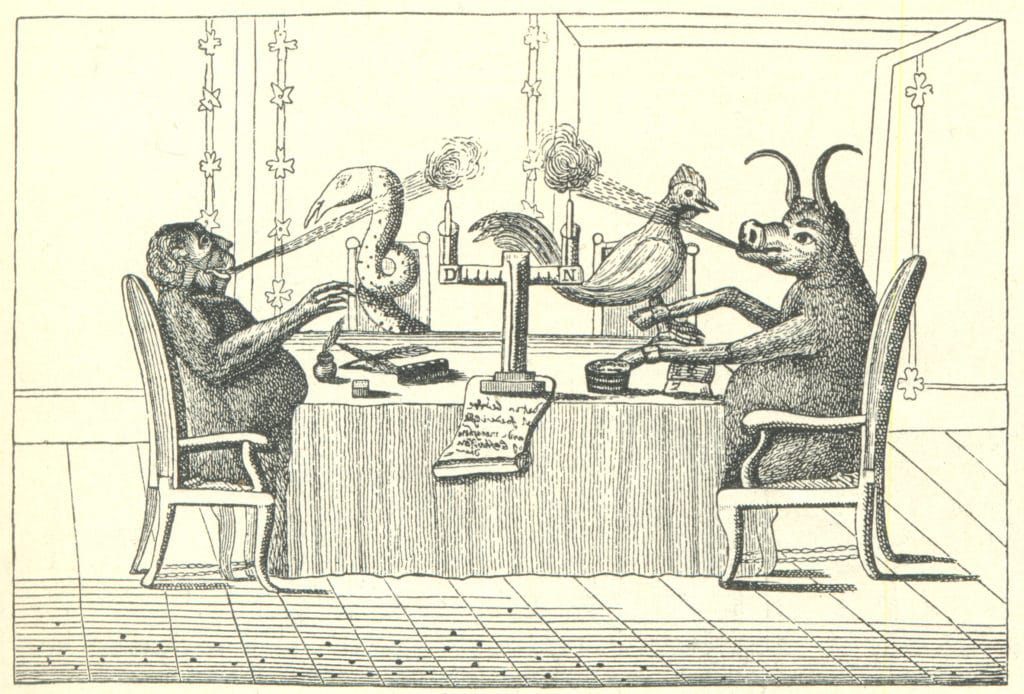
Litteratur:
Luxdorphs samling af trykkefrihedens skrifter 1770-1773: Bibliografi over samlingens 46 bind (pdf). Af Henrik Horstbøll (Det Kongelige Bibliotek, 2005, 91 sider)
Grov Konfækt: Tre vilde år med trykkefrihed 1770-1773. Bind 1-2. Af Henrik Horstbøll, Ulrik Langen og Frederik Stjernfelt (Gyldendal, 2020, 1080 sider). Se interview med forfatterne: Tre vilde år med trykkefrihed i 1700-tallet bød på shitstorme, samfundskritik og masser af intriger (Information.dk, 11. september 2020, bogtillæg, side 6-9). Kun online for abonnenter. Se anmeldelser:
- ’Grov konfækt’ er en velplaceret huskekage til dovne ytringsfrihedshavere. Af Anita Brask Rasmussen (Information.dk, 14. september 2020, side 14-15). “Nyt mammutværk placerer trykkefrihedens tre vilde år centralt i Danmarkshistorien … og tilbyder en forståelsesramme for de bomber, der bliver smidt i den moderne offentlighed”. Kun online for abonnenter.
- ‘Grov konfækt’ er manna – nej slik – for sjælen. Af Jes Stein Pedersen (Politiken.dk, 14. september 2020, side 1+4). “… den moderne debat fødtes dengang, og at der ligger litterære skatte og gemmer sig til de forskere, der gider at gå i gang.” Kun online for abonnenter.
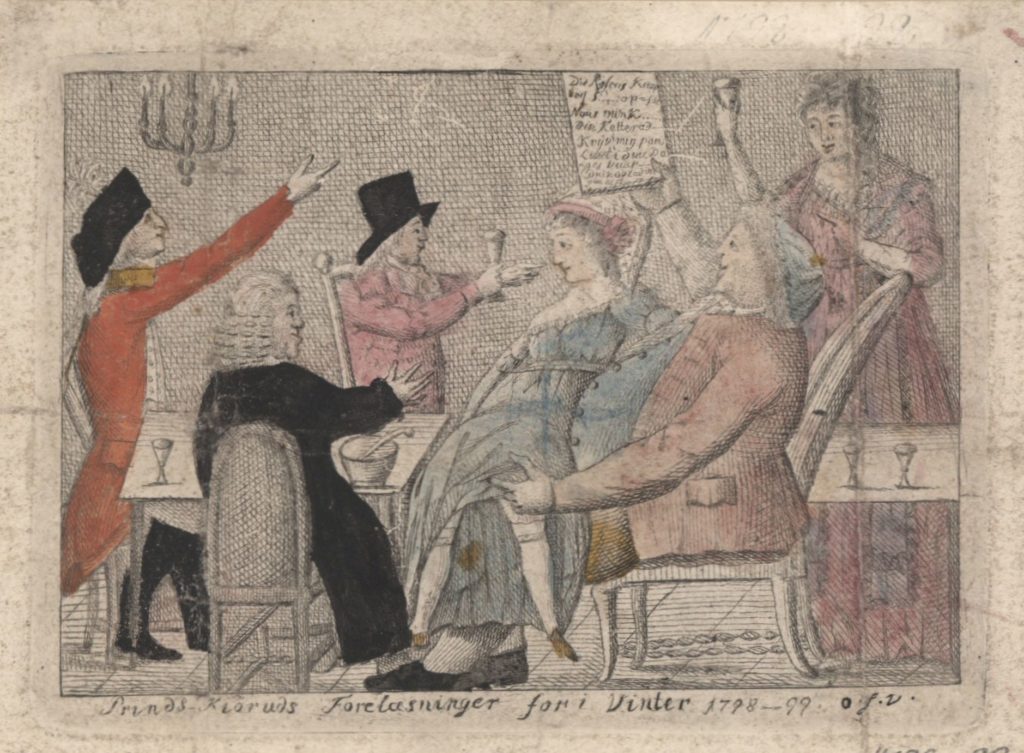
Se også på Socialistisk Bibliotek:
- Tidslinjen: 28. april 1772, om Struensee.
- Linkboxen: Oplysningstiden/The Enlightenment
17. december 1770
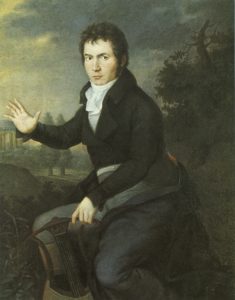
Ludwig van Beethoven døbes i Bonn [fødedag ukendt, sandsynligvis 16. december] (dør 28. marts 1827 i Wien).
From the article below by Alan Woods on the Fifth Symphony: “A revolutionary spirit moves every bar of the Fifth. The celebrated opening bars of this work … are perhaps the most striking opening of any musical work in history. The conductor Nikolaus Harnancourt … has said of this symphony: “This is not music; it is political agitation. It is saying to us: the world we have is no good. Let us change it! Let’s go!”
Ludwig Van Beethoven’s 5th Symphony in C Minor (Full) (YouTube, 36:20 min.)
Links:
- Ludwig van Beethoven (Denstoredanske.dk)
- Ludwig van Beethoven (Wikipedia.org)
Beethoven var romantiker og oprører. Af Klaus Haase (Arbejderen.dk, 26. januar 2008). “Den borgerlig, revolutionære Beethoven kan sagtens sammenlignes med den senere tids guitarist og komponist Jimmi Hendrix. De formåede i hvert sit århundrede at se nye muligheder i deres instrument.”
Louis van Beethoven: A German film biography of the great composer. By Clara Weiss (World Socialist Web Site, 18 January 2021). “The movie introduces many important themes of the revolutionary epoch that shaped Beethoven as a composer and thinker, but barely develops them.”
Ludwig van Beethoven: revolutionary composer. By Sabby Sagall (International Socialism, Issue 169, Winter 2021, p.178-196). “December 2020 marks the 250th anniversary of the birth of Ludwig van Beethoven, one of Europe’s greatest composers, a musician of a revolutionary era who revolutionised music.”
Revolutionary Beethoven. By Bill Hopwood (International Socialist Alternative, 25 December 2020). “Beethoven’s musical beauty and genius is best understood in the context of the revolutionary changes of his time — in society and art.”
The revolutionary genius of Ludwig van Beethoven. By Simon Behrman (Jacobin, December 17, 2020). “250 years after his birth, Beethoven’s music still has an exhilarating, subversive power. His revolution of artistic form was intimately linked to his sympathy for the political revolutions of his time.”
The contemporary relevance of Ludwig van Beethoven on the 250th anniversary of his birth. By Verena Nees and Peter Schwarz (World Socialist Web Site, 17 December 2020). “Beethoven was the most profound musical voice during a period in which humanity progressed in quantum leaps. His works are ineradicably connected with the striving for human liberation.”
Beethoven: revolutionary times (Michael Roberts Blog, December 16, 2020). “Beethoven is considered the most musically revolutionary of ‘classical’ composers. And in my view, that was no accident of history because Beethoven was a man of his time.”
The revolutionary Beethoven (Counterfire, October 9, 2020). “In the 250th year of Beethoven’s birth, Chris Wright reflects on the revolutionary edge of the great composer’s music.”
Classical Music – Beethoven. By Gareth Jenkins (Socialist Review, Issue 457, May 2020). “What marked his artistic development was the impact of the Enlightenment revolution in ideas, particularly of freedom, equality and fraternity, that found material expression in the French Revolution.”
Beethoven: man, composer, revolutionary. By Alan Woods (In Defence of Marxism, 26 March 2020/1 May 2006). “If any composer deserves the name of revolutionary it is Beethoven. He carried through what was probably the greatest single revolution in modern music and changed the way music was composed and listened to.”
In search of Beethoven. By Louis Proeyct (The Unrepentant Marxist, September 23, 2009). “And most of all, we marvel at his ability to make some of the greatest music ever composed while he was stone deaf.”
The revolutionary Beethoven (Frontline, Issue 17, 2005). “Steve Arnott looks at the work and ideas of a musical genius who was inspired by revolutionary times.”
Beethoven’s cry of freedom. By Gareth Jenkins (Socialist Worker, Issue 1871, 4 October 2003). On Beethoven and his ninth symphony: “Beethoven’s music is above all about struggle and freedom.”
The romantic cult and the Ode to Joy. An excerpt from Beethoven’s Ninth: A Political History. By Esteban Buch (University of Chicago Press, 2003)
Beethoven the revolutionary. A three part essay by Stephen Johnson (BBC; Radio 3; The Beethoven Experience)
‘Fidelio’ (1805)
Om Beethovens eneste opera (1805, og udgaver 1806 + 1814), ‘friheds-operaen’ Fidelio:
Beethoven’s opera Fidelio for a new online audience of millions. By Bernd Reinhardt (World Socialist Web Site, 14 May 2020). Om Fidelio’s historie ift. den franske revolution, Napoleon-tiden og om en ny-opførelse.
Online på YouTube.com (2:15 hour). Royal Opera House, starring Lise Davidsen and David Butt Philip, tysk tekst, English subtitles.
Fange-koret, Fidelio, 1. akt: Fange-koret, “Oh welche Lust, in freier Luft …” (YouTube.com, 7:19 min.). Tysk og engelsk tekst, scroll ned.
Litteratur:
Beethoven og hans tid. Af Paul Nettl. (Hasselbalch, 1965, 251 sider)
















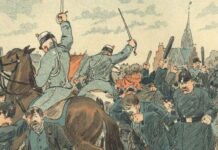


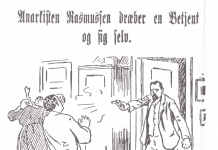







![Illustration to Robert Burns' poem Auld Lang Syne by J.M. Wright and Edward Scriven. The Complete Works of Robert Burns: Containing the Poems, Songs, and Correspondence. Illustrated By W.H. Bartlett, T. Allom, and Other Artists. With a New Life of the Poet, and Notices, Critical and Biographical[1] by Allan Cunningham. Published in London by George Virtue. No year is given explicitly, but "James Gibson 1856" has been handwritten inside the front cover, it's dedicated to a MP, Archibald Hastie of Paisley, who was no longer a MP by 1857, and some of the artists and engravers were dead before 1842. As such, I'm going with c. 1841 as the year, though it could be as late as 1856, when James Gibson evidently acquired. From: The Complete Works of Robert Burns: Containing the Poems, Songs, and Correspondence. Illustrated By W.H. Bartlett, T. Allom, and Other Artists. With a New Life of the Poet, and Notices, Critical and Biographical by Allan Cunningham, London: George Virtue. Drawn by John Masey Wright (1777–1866, artist), Engraved by John Rogers (c. 1808-c. 1888, engraver), Restored by Adam Cuerden (1979–, restorationist), Cropped by Beyond My Ken. Public Domain.](https://socbib.dk/wp-content/uploads/2018/02/John_Masey_Wright_-_John_Rogers_-_Robert_Burns_-_Auld_Lang_Syne_crop-100x70.jpg)




